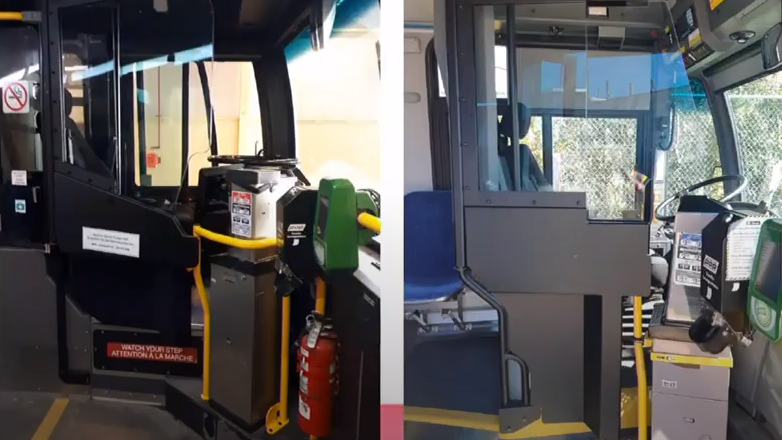
Protective barriers credited for drop in serious assaults against OC Transpo drivers
 OC Transpo conducted tests on new permanent barriers for drivers. (Photo courtesy: City of Ottawa)
OC Transpo conducted tests on new permanent barriers for drivers. (Photo courtesy: City of Ottawa)
OC Transpo and the union representing bus drivers credit the installation of protective barriers on buses for a decline in the number of assaults involving Ottawa bus drivers.
However, the Amalgamated Transit Union says its members still face incidents of verbal assaults and spitting from riders on OC Transpo buses.
Statistics provided to CTV News Ottawa show there were 34 bus driver assaults in the first nine months of 2022, and 38 assaults in 2021. That's down from 65 bus driver assaults in 2020 and 87 in 2019.
"Over the years, the numbers were pretty high until we installed barriers, shields on the buses," Amalgamated Transit Union Local 279 President Clint Crabtree told CTV News Ottawa.
"After doing that, we've seen the number of serious assaults drop because the operators are behind the shield and barrier, but what we continue to see is verbal assaults and spitting at the operators – so they're spitting at the shield."
In 2020, the Transit Commission approved $6 million in funding to install permanent barriers on OC Transpo buses to protect bus drivers. The installation of more than 700 barriers started in April 2021, and was finished a few months later.
"Any assault on anybody shouldn't be happening, but the assaults have come down due to the fact we have shields and barriers on the buses," Crabtree said.
OC Transpo says there has been a "consistent reduction in the rate of assaults" against bus drivers since 2018, when 105 incidents were reported.
"A more pronounced reduction is seen from 2020 to 2022 when protective barriers were installed," OC Transpo Chief Safety Officer Paul Treboutat said in a statement to CTV News Ottawa.
"Staff note that while there may be a correlation between ridership levels and operator assaults, isolating the operators as much as possible with barriers has resulted in positive impacts on the reduction in assault occurrences."
The Amalgamated Transit Union is calling for a national transit safety task force, as the union says violent attacks on public transit have reached "crisis levels". The ATU says the task force must include transit agencies and representatives of all levels of government.
The call for a task force comes after a number of violent attacks on Toronto Transit Commission buses and the subway system, targeting workers and riders. Police reported several incidents, including a TTC driver shot with a BB gun and two TTC workers assaulted on their way back to work.
"We don't want to see anybody get assaulted, that's all there is to it," Crabtree said, noting the ATU is looking at "all avenues" to improve safety for riders and employees.
"We need to do something to address it and fix it immediately."
CTVNews.ca Top Stories

B.C. tenants evicted for landlord's use after refusing large rent increase to take over neighbouring suite
Ashley Dickey and her mother rented part of the same Coquitlam duplex in three different decades under three different landlords.
Mountain guide dies after falling into a crevasse in Banff National Park
A man who fell into a crevasse while leading a backcountry ski group deep in the Canadian Rockies has died.
opinion The special relationship between King Charles and the Princess of Wales
Royal commentator Afua Hagan writes that when King Charles recently admitted Catherine to the Order of the Companions of Honour, it not only made history, but it reinforced the strong bond between the King and his beloved daughter-in-law.
Expert warns of food consumption habits amid rising prices
A new survey by Dalhousie University's Agri-Food Analytics Lab asked Canadians about their food consumption habits amid rising prices.
MPP Sarah Jama asked to leave Ontario legislature for wearing keffiyeh
MPP Sarah Jama was asked to leave the Legislative Assembly of Ontario by House Speaker Ted Arnott on Thursday for wearing a keffiyeh, a garment which has been banned at Queen’s Park.
Charlie Woods, son of Tiger, shoots 81 in U.S. Open qualifier
Charlie Woods failed to advance in a U.S. Open local qualifying event Thursday, shooting a 9-over 81 at Legacy Golf & Tennis Club.
Ex-tabloid publisher testifies he scooped up possibly damaging tales to shield his old friend Trump
As Donald Trump was running for president in 2016, his old friend at the National Enquirer was scooping up potentially damaging stories about the candidate and paying out tens of thousands of dollars to keep them from the public eye.
Here's why provinces aren't following Saskatchewan's lead on the carbon tax home heating fight
After Prime Minister Justin Trudeau said the federal government would still send Canada Carbon Rebate cheques to Saskatchewan residents, despite Saskatchewan Premier Scott Moe's decision to stop collecting the carbon tax on natural gas or home heating, questions were raised about whether other provinces would follow suit. CTV News reached out across the country and here's what we found out.
Montreal actress calls Weinstein ruling 'discouraging' but not surprising
A Montreal actress, who has previously detailed incidents she had with disgraced Hollywood producer Harvey Weinstein, says a New York Court of Appeals decision overturning his 2020 rape conviction is 'discouraging' but not surprising.
































